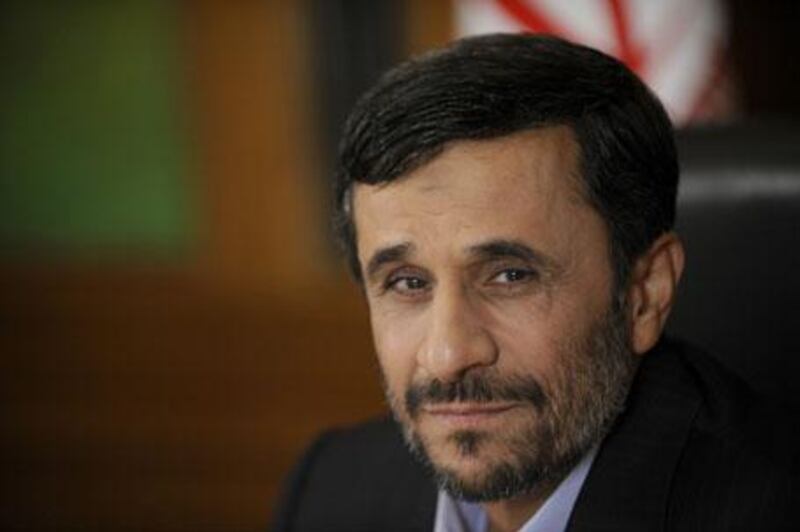The president of Iran, Mahmoud Ahmadinejad, boasted yesterday that his country was now dealing from a position of strength with the West over its nuclear programme and dismissed the Islamic republic's enemies as "mosquitoes". At home, his nominal support for a deeply uncertain deal with the West to defuse the nuclear crisis has provoked strident criticism from opponents across the political spectrum.
His reformist rivals support accommodation with the international community but fear that Mr Ahmadinejad is using negotiations with western powers to bolster his legitimacy, which has been undermined domestically by his disputed re-election in June. The Iranian president may, however, be robbed of any chance to claim credit for a diplomatic breakthrough that would improve relations with the United States. Detente with the superpower, officially demonised by Tehran as the "Great Satan", would be very popular with most Iranians according to unofficial opinion polls and analysts.
But a landmark, if tentative, deal between Iran and the West, reached just over a month ago in Geneva, seems to be unravelling. Failure would see the US pressing for tougher sanctions and bringing renewed threats of military action by Israel, the region's sole, if undeclared, nuclear-armed power. The Geneva deal, reaffirmed in Vienna, requires Iran to send most of its low-enriched uranium (LEU) abroad. That would delay Tehran's production of a nuclear weapon by a year, buying time for a comprehensive settlement of the seven-year-old nuclear standoff.
Russia would enrich the uranium further before sending it to France for conversion into fuel plates that Iran would use in a medical reactor. After missing a deadline to confirm the deal, Iran last Thursday delivered only an "initial" response to Mohammed ElBaradei, the head of the International Atomic Energy Agency (IAEA) in Vienna. Mir Hossein Mousavi, whom millions of Iranians believe was the true winner of June's elections, has attacked the proposed accord. "Today, it appears that a large proportion of the product of Iran's nuclear programme, which has caused much chaos and brought a number of sanctions for the people, must be handed over to another country, in hopes that they will be kind enough to offer us some fuel later on," he said.
Iran's reformists have always been staunch advocates of Iran's right to develop nuclear technology for the peaceful generation of power. But they have long claimed that Mr Ahmadinejad has recklessly jeopardised Iran's cherished nuclear programme with his inflammatory rhetoric against Israel, which has heightened western suspicions of Iran's atomic ambitions. Three sets of UN Security Council sanctions were imposed on Mr Ahmadinejad's watch.
Iranian hardliners were bitterly critical of Mohammad Khatami, the reformist former president, when his government agreed to temporarily suspend uranium enrichment in 2003, and succeeded in scuppering his attempts to mend fences with Washington. He never would have dared to consider a deal under which Iran would export the bulk of its LEU stockpile, analysts say. Mr Ahmadinejad's opponents now sense an opportunity for payback.
Iranian conservatives, meanwhile, are opposed to the "unacceptable" Vienna accord from a different perspective. For them, Iran's LEU stockpile is a "crown jewel" that provides vital leverage in any talks with "the global arrogance" United States. The IAEA and western capitals have not divulged the contents of Iran's belated response - beyond saying that they are waiting for "clarification" from Tehran. But leaked accounts, supported by Iranian state-run media, suggest Iran wants significant changes that would negate the whole point of the accord.
Tehran, it is said, will only agree to export its LEU in small batches, with each fresh consignment exported once Iran receives the equivalent of what it has sent. Alternatively, Iran is reportedly offering to enrich its own LEU to a higher level for its medical reactor under IAEA supervision. Both suggestions are unacceptable to the West because neither would remove Iran's "breakout capacity": the ability to produce an atom bomb at short notice if it breaks out of non-proliferation treaty obligations and enriches its uranium to the 90 per cent level needed for weaponisation.
"I think there are back room negotiations right now going on in order to give Iran one last chance to negotiate and to come to some kind of favourable agreement and, if not, they're [the IAEA and the US] going to go public with it [the Iranian response]," said Meir Javedanfar, an Iranian-born analyst based in Israel and co-author of The Nuclear Sphinx of Tehran. He said in an interview: "I think the Iranians want to play their hand and see how much they can push their own terms."
Iran is relying on Russia and China, both permanent members of the UN Security Council with veto powers, to stave off or dilute further sanctions. Moscow reaffirmed its opposition to sanctions yesterday but put rare public pressure on Iran. Declaring that Iran's nuclear programme lacks "complete transparency", Russia's ambassador to Tehran, Alexander Sadovnikov, insisted the Vienna deal was not a "trick" to seize the Islamic republic's LEU stockpile, but would be "beneficial" to Iran.
The Iranian government does not want to be seen to reject the agreement. Tehran has portrayed its response to the IAEA as one of "yes, but" rather than "no, unless". Iran can claim the Vienna accord proves it has wrung one major concession from the West: the agreement tacitly acknowledges Tehran's right to use the LEU it has accumulated in violation of UN Security Council resolutions. Mr Ahmadinejad alluded to this last week when he trumpeted: "A few years ago, they [western powers] said we had to completely stop all our nuclear activities. Now they want nuclear co-operation with the Iranian nation."
The danger is that the swaggering Iranian president might overplay his hand by testing too far the patience of his US counterpart, who is also under domestic pressure. Barack Obama's policy of outreach to Tehran is under concerted attack from hawks in Washington. The White House press secretary, Robert Gibbs, warned: "The president's time is not unlimited." @Email:mtheodoulou@thenational.ae





